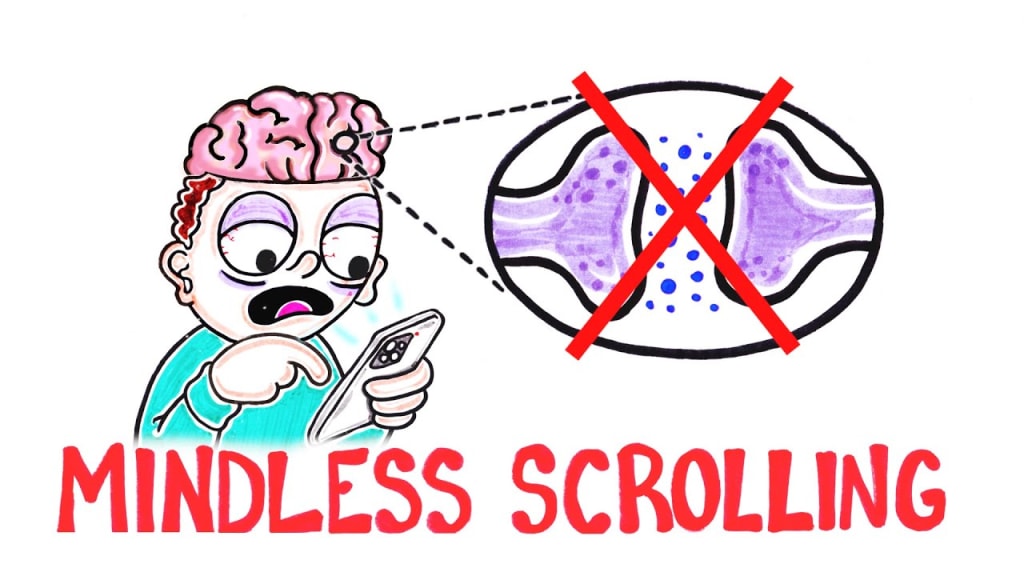What Happens To Your Brain When You Mindlessly Scroll?
In today's digital age, it has become a common habit for many people to mindlessly scroll through their phones or computers. Whether it's social media, news websites, or other online platforms, the endless scrolling can have a significant impact on our brains. But what exactly happens to your brain when you engage in this behavior? In this article, we will explore the effects of mindless scrolling on the brain and why it is important to be mindful of our online habits.

The Science Behind Mindless Scrolling
Dopamine Release
When you mindlessly scroll through your phone, your brain's reward system is activated. This is due to the release of dopamine, a neurotransmitter that plays a key role in pleasure and reward. Every time you see a new post, picture, or video, your brain gets a hit of dopamine, which can create a sense of pleasure and satisfaction. This feeling encourages you to continue scrolling in search of more rewarding content.
Pros of Dopamine Release Cons of Dopamine Release
- Feelings of pleasure and reward - Can lead to addictive behaviors
- Motivates exploration and seeking out new information - May result in decreased attention span
- Helps reinforce certain behaviors - Can contribute to feelings of anxiety and stress
Impact on Attention Span
One of the most significant effects of mindless scrolling on the brain is its impact on attention span. When you are constantly exposed to new and engaging content, your brain becomes accustomed to quick bursts of information. This can make it challenging to focus on tasks that require sustained attention, such as reading a book or working on a project. Over time, this can lead to a decrease in your ability to concentrate and stay focused for extended periods.
Mindless scrolling can lead to a decrease in attention span.
Constant exposure to new content can make it difficult to focus on tasks that require sustained attention.
Over time, this behavior can impact your ability to concentrate and stay focused.
Emotional Regulation
Another aspect of mindless scrolling that affects the brain is its impact on emotional regulation. Social media and online platforms are filled with a wide range of content, from heartwarming stories to distressing news. When you mindlessly scroll through these platforms, you expose yourself to a constant stream of emotions, which can be overwhelming for the brain. This can lead to mood swings, increased stress levels, and difficulty regulating your emotions effectively.
Mindless scrolling exposes you to a wide range of emotions.
Constantly shifting between different emotional states can be overwhelming for the brain.
This can lead to mood swings, increased stress levels, and difficulty regulating emotions effectively.
The Psychological Effects of Mindless Scrolling
Comparison and Self-Esteem
One of the negative consequences of mindless scrolling is its impact on self-esteem and body image. Social media platforms are often filled with carefully curated posts that highlight the best aspects of people's lives. When you compare your own life to the seemingly perfect lives of others, it can lead to feelings of inadequacy and low self-worth. This constant comparison can take a toll on your mental health and contribute to issues such as anxiety and depression.
Comparison to others on social media can lead to feelings of inadequacy and low self-esteem.
Constant exposure to curated posts can create unrealistic expectations and standards.
This can contribute to issues such as anxiety, depression, and poor body image.
Fear of Missing Out (FOMO)
The fear of missing out, or FOMO, is another psychological effect of mindless scrolling. When you see your friends or acquaintances posting about their exciting experiences and adventures, it can trigger feelings of envy and anxiety about missing out on similar opportunities. This fear of missing out can drive you to constantly check your phone or social media accounts to stay updated on what others are doing, leading to a cycle of comparison and dissatisfaction.
The fear of missing out can be triggered by seeing others' exciting experiences on social media.
It can lead to feelings of envy, anxiety, and dissatisfaction with your own life.
This fear drives the urge to constantly check your phone or social media accounts to stay updated.
Sleep Disruption
Mindless scrolling before bedtime can have a significant impact on your sleep quality. The blue light emitted by screens can interfere with the production of melatonin, a hormone that regulates sleep-wake cycles. Exposure to screens right before bed can disrupt your circadian rhythm and make it difficult to fall asleep. Additionally, engaging with stimulating content on social media can keep your mind active and alert, making it harder to relax and unwind before bedtime.
Mindless scrolling before bedtime can disrupt your sleep-wake cycle.
The blue light emitted by screens can interfere with the production of melatonin.
Engaging with stimulating content can keep your mind active and make it difficult to relax before sleep.
Strategies to Combat Mindless Scrolling
Set Time Limits
One effective way to combat mindless scrolling is to set time limits for your social media usage. You can use apps or features that track how much time you spend on various platforms and set daily limits for yourself. By being mindful of the time you allocate to scrolling, you can reduce the risk of getting sucked into endless browsing sessions and prioritize activities that add value to your life.
Use apps or features that track your social media usage.
Set daily time limits for yourself to reduce mindless scrolling.
Prioritize activities that add value to your life instead of spending excessive time online.
Create Tech-Free Zones
Designating tech-free zones in your home can help reduce the temptation to mindlessly scroll through your devices. For example, you can choose to keep your bedroom or dining area free from screens to promote better sleep hygiene and more meaningful interactions with your family or housemates. By creating boundaries around where and when you use technology, you can cultivate healthier habits and reduce the negative impact of mindless scrolling on your well-being.
Designate specific areas in your home as tech-free zones.
Keep screens out of spaces like the bedroom or dining area to promote better sleep and quality time with others.
Establishing boundaries around technology use can help cultivate healthier habits.
Practice Mindful Consumption
Instead of mindlessly scrolling through content, practice mindful consumption by actively engaging with the material you encounter online. Before clicking on a link or watching a video, ask yourself if it aligns with your values and interests. Take the time to reflect on how the content makes you feel and whether it adds value to your life. By approaching online consumption with intention and awareness, you can avoid falling into the trap of mindless scrolling.
Actively engage with the content you encounter online.
Reflect on whether the material aligns with your values and interests.
Approach online consumption with intention and awareness to avoid mindless scrolling.
FAQs
How does mindless scrolling affect productivity?
Mindless scrolling can significantly impact productivity by reducing attention span and increasing distractions. Constant exposure to new content can make it challenging to focus on tasks that require sustained attention, leading to decreased efficiency and performance.
Can mindless scrolling contribute to feelings of anxiety and stress?
Yes, mindless scrolling can contribute to feelings of anxiety and stress. The constant exposure to a wide range of emotions and information online can be overwhelming for the brain, leading to increased stress levels and difficulty regulating emotions effectively.
Is it possible to break the habit of mindless scrolling?
Yes, it is possible to break the habit of mindless scrolling with conscious effort and strategies. Setting time limits, creating tech-free zones, and practicing mindful consumption are effective ways to reduce excessive screen time and cultivate healthier online habits.
How does mindless scrolling before bedtime affect sleep quality?
Mindless scrolling before bedtime can disrupt sleep quality by interfering with the production of melatonin, a hormone that regulates sleep-wake cycles. The blue light emitted by screens can suppress melatonin production, making it difficult to fall asleep and negatively impacting overall sleep quality.
What are the long-term effects of mindless scrolling on mental health?
The long-term effects of mindless scrolling on mental health can include issues such as anxiety, depression, low self-esteem, and poor body image. Constant comparison to others on social media, fear of missing out, and disrupted sleep patterns can take a toll on overall well-being and contribute to mental health challenges.
Conclusion
In conclusion, mindless scrolling can have a profound impact on our brains and overall well-being. From the release of dopamine and its effects on attention span to the psychological consequences of comparison and FOMO, it is essential to be aware of how our online habits influence our mental health. By implementing strategies to combat mindless scrolling, such as setting time limits, creating tech-free zones, and practicing mindful consumption, we can cultivate healthier relationships with technology and prioritize activities that enrich our lives. Remember, being mindful of your online behavior is key to maintaining a healthy balance between the digital world and real life.
About the Creator
Enjoyed the story? Support the Creator.
Subscribe for free to receive all their stories in your feed. You could also pledge your support or give them a one-off tip, letting them know you appreciate their work.





Comments
There are no comments for this story
Be the first to respond and start the conversation.